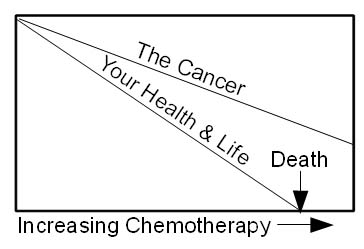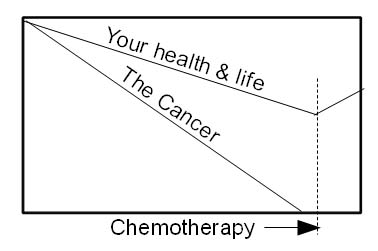There can hardly be any good news if one is diagnosed with cancer, but some approaches seem to offer much better odds than others, but of course no guarantees. There are many promising alternative cancer treatments with varying odds of success, which always seem to be strenuously opposed by the cancer industry and government. Some are very expensive, some require an almost impossible level of effort and commitment, and for some it is difficult to find the supplies or skills needed. I have chosen these below because I believe they are an effective combination of the conventional and alternative, and they are achievable at reasonable expense and effort without “rocking the boat” too much.
One of the primary treatments for cancer is conventional chemotherapy with its horrible side effects and extreme toxicity. So it becomes a race between destruction of the cancer and destruction of your health and life. If one wins the race, he is cured, and if not he is of course dead. I know of many who have lost that race and few who have won it. How many do you know of?
It seems to me that cancer treatment should be considered successful only if a patient recovers and is able to live a normal life. But it seems ridiculous to me that it is counted as a success if a patient survives 5 years or more, no matter how sick he was and dies one day later. Even by this extremely deficient definition, chemotherapy is only about 2% successful, astounding for such a highly touted treatment. The rate of spontaneous cancer remission is not known, but if it were higher than the 2%, in a statistical sense one would be better off doing nothing. If such abysmal odds are correct (don’t believe me but check it out for yourself), what rational person could say it is wise, to say nothing of the suffering and pain of it. Cancer researcher Dr. Hardin Jones states that “untreated cancer victims actually live up to four times longer than treated individuals.”
There is no question that chemotherapy is very good at destroying cancer, but it usually destroy one’s health and life even faster. Isn’t winning the race all that matters, and can the odds of winning the race be improved significantly? Yes, but they are generally outside conventional medicine?
1. Use of Large Amounts of Nutritional Supplements. The Internet seems to show that nutritional supplements are usually discouraged by oncologists because they believe they will slow down the destruction of the cancer or interfere in other ways with the chemotherapy. But winning the race is is the only thing that matters, even if it takes longer. In cases I know about using mega-doses of supplements, the patient does not get very sick from each treatment, recovers quickly, does not lose much strength, and the hair may not even fall out. This way, chemotherapy can be continued much longer until hopefully all the cancer is destroyed. Furthermore, some research indicates that the supplements actually can make chemotherapy more effective in destroying the cancer, so that would obviously be far better.
If the oncologist were amenable, I would cooperate with him, but would also do my own thorough research to be sure he was genuinely supportive and knowledgeable of nutrition in large quantity. I would be wary if he says a good diet is sufficient, or minimal supplements will suffice.
In case the oncologist were not fully supportive, the least disruptive way to proceed would be to accept conventional chemotherapy, and use nutritional supplements without informing him. I also know of a doctor who fully understands the benefits and gives intravenous vitamins and other nutrients before and after chemotherapy, an even more effective manner of nutritional supplementation. In cases I know about, the results have been good and the oncologist tends to make remarks like “your blood counts shouldn’t be this good”, and the patient does not get very sick. Doing it on my own, it would be extremely important to do my own thorough research to know which supplements are most beneficial in this context, and in what quantities, and how to use them. This is the route I believe I would go if I could not afford IPT. If the odds of success with chemotherapy are correctly stated above, I would have nothing to lose but the cost of the supplements.
2. Insulin Potentiation Therapy (IPT). Cancer cells can only metabolize glucose and have a voracious appetite for it and so usually have at least ten times as many insulin receptors as normal cells. First, insulin is given to reduce blood glucose to the point that that the cancer cells “panic” and open up their insulin receptors to get as much glucose as possible. Then the chemotherapy is administered, but typically only about 10% to 15% of the conventional dose, so that the chemotherapy preferentially enters the open cancer cells. With or immediately after administering the chemotherapy, the blood glucose is brought back up to normal. Because normal cells are hardly damaged at all and the patient gets only slightly sick or not at all, the treatment can be continued as long as necessary and IPT has been shown to be as effective as conventional chemotherapy at killing cancer cells. It is claimed that the majority of patients get well. There are a few clinics offering this treatment. A big problem with IPT is that most medical insurance will not cover anything but conventional chemotherapy, and to bill IPT as conventional chemotherapy would probably be considered fraud.
3. Whatever the treatment, since cancer can only utilize glucose suggests that completely eliminating carbohydrates would starve cancer and give much better odds of success. In fact, Dr. Fred Hatfield, given 3 months to live, cured his own cancer by only eating moderate protein and healthy fats.
4. Appropriately combining all these would probably give the the best results.
I am not a medical doctor so none of this can be considered medical advice, but is my personal opinion given under the doctrine of freedom of speech. Before treatment of any kind, it is imperative that you do your own research and make your own decisions.
However ultimate healing can only be found in Jesus Christ: “For the wages of sin is death, but the free gift of God is eternal life in Christ Jesus our Lord.” Romans 6:23


